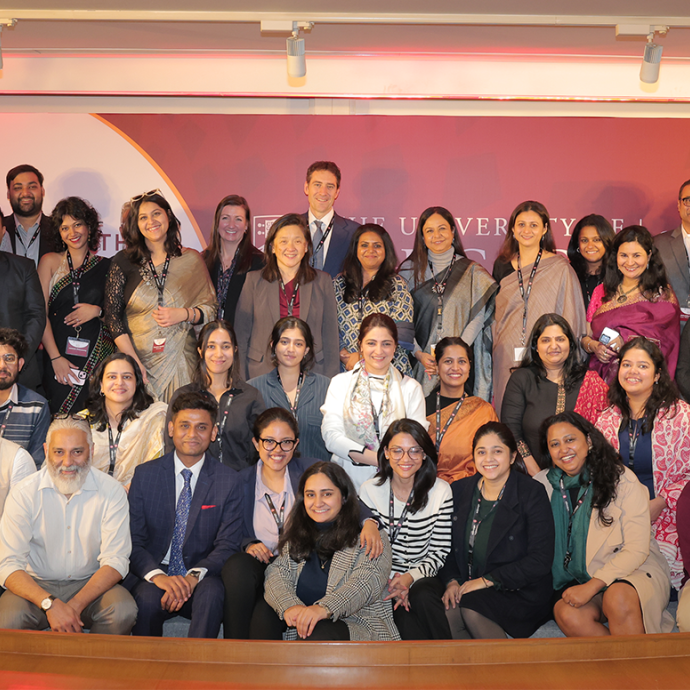Field experiments, explained
Editor’s note: This is part of a series called “The Day Tomorrow Began,” which explores the history of breakthroughs at UChicago. Learn more here.
A field experiment is a research method that uses some controlled elements of traditional lab experiments, but takes place in natural, real-world settings. This type of experiment can help scientists explore questions like: Why do people vote the way they do? Why do schools fail? Why are certain people hired less often or paid less money?
University of Chicago economists were early pioneers in the modern use of field experiments and conducted innovative research that impacts our everyday lives—from policymaking to marketing to farming and agriculture.

Jump to a section:
What is a field experiment, why do a field experiment, what are examples of field experiments, when did field experiments become popular in modern economics, what are criticisms of field experiments.
Field experiments bridge the highly controlled lab environment and the messy real world. Social scientists have taken inspiration from traditional medical or physical science lab experiments. In a typical drug trial, for instance, participants are randomly assigned into two groups. The control group gets the placebo—a pill that has no effect. The treatment group will receive the new pill. The scientist can then compare the outcomes for each group.
A field experiment works similarly, just in the setting of real life.
It can be difficult to understand why a person chooses to buy one product over another or how effective a policy is when dozens of variables affect the choices we make each day. “That type of thinking, for centuries, caused economists to believe you can't do field experimentation in economics because the market is really messy,” said Prof. John List, a UChicago economist who has used field experiments to study everything from how people use Uber and Lyft to how to close the achievement gap in Chicago-area schools . “There are a lot of things that are simultaneously moving.”
The key to cleaning up the mess is randomization —or assigning participants randomly to either the control group or the treatment group. “The beauty of randomization is that each group has the same amount of bad stuff, or noise or dirt,” List said. “That gets differenced out if you have large enough samples.”
Though lab experiments are still common in the social sciences, field experiments are now often used by psychologists, sociologists and political scientists. They’ve also become an essential tool in the economist’s toolbox.
Some issues are too big and too complex to study in a lab or on paper—that’s where field experiments come in.
In a laboratory setting, a researcher wants to control as many variables as possible. These experiments are excellent for testing new medications or measuring brain functions, but they aren’t always great for answering complex questions about attitudes or behavior.
Labs are highly artificial with relatively small sample sizes—it’s difficult to know if results will still apply in the real world. Also, people are aware they are being observed in a lab, which can alter their behavior. This phenomenon, sometimes called the Hawthorne effect, can affect results.
Traditional economics often uses theories or existing data to analyze problems. But, when a researcher wants to study if a policy will be effective or not, field experiments are a useful way to look at how results may play out in real life.
In 2019, UChicago economist Michael Kremer (then at Harvard) was awarded the Nobel Prize alongside Abhijit Banerjee and Esther Duflo of MIT for their groundbreaking work using field experiments to help reduce poverty . In the 1990s and 2000s, Kremer conducted several randomized controlled trials in Kenyan schools testing potential interventions to improve student performance.
In the 1990s, Kremer worked alongside an NGO to figure out if buying students new textbooks made a difference in academic performance. Half the schools got new textbooks; the other half didn’t. The results were unexpected—textbooks had no impact.
“Things we think are common sense, sometimes they turn out to be right, sometimes they turn out to be wrong,” said Kremer on an episode of the Big Brains podcast. “And things that we thought would have minimal impact or no impact turn out to have a big impact.”
In the early 2000s, Kremer returned to Kenya to study a school-based deworming program. He and a colleague found that providing deworming pills to all students reduced absenteeism by more than 25%. After the study, the program was scaled nationwide by the Kenyan government. From there it was picked up by multiple Indian states—and then by the Indian national government.
“Experiments are a way to get at causal impact, but they’re also much more than that,” Kremer said in his Nobel Prize lecture . “They give the researcher a richer sense of context, promote broader collaboration and address specific practical problems.”
Among many other things, field experiments can be used to:
Study bias and discrimination
A 2004 study published by UChicago economists Marianne Bertrand and Sendhil Mullainathan (then at MIT) examined racial discrimination in the labor market. They sent over 5,000 resumes to real job ads in Chicago and Boston. The resumes were exactly the same in all ways but one—the name at the top. Half the resumes bore white-sounding names like Emily Walsh or Greg Baker. The other half sported African American names like Lakisha Washington or Jamal Jones. The study found that applications with white-sounding names were 50% more likely to receive a callback.
Examine voting behavior
Political scientist Harold Gosnell , PhD 1922, pioneered the use of field experiments to examine voting behavior while at UChicago in the 1920s and ‘30s. In his study “Getting out the vote,” Gosnell sorted 6,000 Chicagoans across 12 districts into groups. One group received voter registration info for the 1924 presidential election and the control group did not. Voter registration jumped substantially among those who received the informational notices. Not only did the study prove that get-out-the-vote mailings could have a substantial effect on voter turnout, but also that field experiments were an effective tool in political science.
Test ways to reduce crime and shape public policy
Researchers at UChicago’s Crime Lab use field experiments to gather data on crime as well as policies and programs meant to reduce it. For example, Crime Lab director and economist Jens Ludwig co-authored a 2015 study on the effectiveness of the school mentoring program Becoming a Man . Developed by the non-profit Youth Guidance, Becoming a Man focuses on guiding male students between 7th and 12th grade to help boost school engagement and reduce arrests. In two field experiments, the Crime Lab found that while students participated in the program, total arrests were reduced by 28–35%, violent-crime arrests went down by 45–50% and graduation rates increased by 12–19%.
The earliest field experiments took place—literally—in fields. Starting in the 1800s, European farmers began experimenting with fertilizers to see how they affected crop yields. In the 1920s, two statisticians, Jerzy Neyman and Ronald Fisher, were tasked with assisting with these agricultural experiments. They are credited with identifying randomization as a key element of the method—making sure each plot had the same chance of being treated as the next.
The earliest large-scale field experiments in the U.S. took place in the late 1960s to help evaluate various government programs. Typically, these experiments were used to test minor changes to things like electricity pricing or unemployment programs.
Though field experiments were used in some capacity throughout the 20th century, this method didn’t truly gain popularity in economics until the 2000s. Kremer and List were early pioneers and first began experimenting with the method in the 1990s.
In 2004, List co-authored a seminal paper defining field experiments and arguing for the importance of the method. In 2008, he and UChicago economist Steven Levitt published another study tracing the history of field experiments and their impact on economics.
In the past few decades, the use of field experiments has exploded. Today, economists often work alongside NGOs or nonprofit organizations to study the efficacy of programs or policies. They also partner with companies to test products and understand how people use services.
There are several ethical discussions happening among scholars as field experiments grow in popularity. Chief among them is the issue of informed consent. All studies that involve human test subjects must be approved by an institutional review board (IRB) to ensure that people are protected.
However, participants in field experiments often don’t know they are in an experiment. While an experiment may be given the stamp of approval in the research community, some argue that taking away peoples’ ability to opt out is inherently unethical. Others advocate for stricter review processes as field experiments continue to evolve.
According to List, another major issue in field experiments is the issue of scale . Many experiments only test small groups—say, dozens to hundreds of people. This may mean the results are not applicable to broader situations. For example, if a scientist runs an experiment at one school and finds their method works there, does that mean it will also work for an entire city? Or an entire country?
List believes that in addition to testing option A and option B, researchers need a third option that accounts for the limitations that come with a larger scale. “Option C is what I call critical scale features. I want you to bring in all of the warts, all of the constraints, whether they're regulatory constraints, or constraints by law,” List said. “Option C is like your reality test, or what I call policy-based evidence.”
This problem isn’t unique to field experiments, but List believes tackling the issue of scale is the next major frontier for a new generation of economists.
Hero photo copyright Shutterstock.com
More Explainers

Dark energy, explained

Improv, Explained
Get more with UChicago News delivered to your inbox.
Recommended Stories

An economist illuminates our giving habits—during the pandemic and…

Collaborating with Kenyan government on development innovations is…
Related Topics
Latest news, looking back at 2024 at the university of chicago.

UChicago President Paul Alivisatos honored with Enrico Fermi Presidential Award

UChicago Class Visits
UChicago students engage their senses outside the classroom

Center in Delhi
A decade of impact: UChicago Center in Delhi celebrates 10th anniversary

Go 'Inside the Lab' at UChicago
Explore labs through videos and Q&As with UChicago faculty, staff and students

Recommended Reading
What to read and watch over winter break 2024

Big Brains podcast
Big Brains podcast: What’s the truth about alcohol’s benefits and risks?
Around uchicago.

UChicago Prof. James A. Robinson and alum John Jumper awarded Nobel Prizes
Partnerships
UChicago to collaborate with IBM, Illinois on new National Quantum Algorithm Ce…
Uchicago celebrates opening of john w. boyer center in paris.
New Institute
UChicago launches groundbreaking new institute to confront climate change

Nobel Prize
Nobel laureate finds his ‘calling’ in studying the world

How an ‘accidental chemist’ honed his approach at UChicago on the way to a Nobel Prize
Film History
“Throughout my time at UChicago, I’ve sought to provide opportunities to share scholarship with the public”

Scholarship
UChicago alum named 2025 Marshall Scholar
Experimental Method In Psychology
Saul McLeod, PhD
Editor-in-Chief for Simply Psychology
BSc (Hons) Psychology, MRes, PhD, University of Manchester
Saul McLeod, PhD., is a qualified psychology teacher with over 18 years of experience in further and higher education. He has been published in peer-reviewed journals, including the Journal of Clinical Psychology.
Learn about our Editorial Process
Olivia Guy-Evans, MSc
Associate Editor for Simply Psychology
BSc (Hons) Psychology, MSc Psychology of Education
Olivia Guy-Evans is a writer and associate editor for Simply Psychology. She has previously worked in healthcare and educational sectors.
On This Page:
The experimental method involves the manipulation of variables to establish cause-and-effect relationships. The key features are controlled methods and the random allocation of participants into controlled and experimental groups .
What is an Experiment?
An experiment is an investigation in which a hypothesis is scientifically tested. An independent variable (the cause) is manipulated in an experiment, and the dependent variable (the effect) is measured; any extraneous variables are controlled.
An advantage is that experiments should be objective. The researcher’s views and opinions should not affect a study’s results. This is good as it makes the data more valid and less biased.
There are three types of experiments you need to know:
1. Lab Experiment
A laboratory experiment in psychology is a research method in which the experimenter manipulates one or more independent variables and measures the effects on the dependent variable under controlled conditions.
A laboratory experiment is conducted under highly controlled conditions (not necessarily a laboratory) where accurate measurements are possible.
The researcher uses a standardized procedure to determine where the experiment will take place, at what time, with which participants, and in what circumstances.
Participants are randomly allocated to each independent variable group.
Examples are Milgram’s experiment on obedience and Loftus and Palmer’s car crash study .
- Strength : It is easier to replicate (i.e., copy) a laboratory experiment. This is because a standardized procedure is used.
- Strength : They allow for precise control of extraneous and independent variables. This allows a cause-and-effect relationship to be established.
- Limitation : The artificiality of the setting may produce unnatural behavior that does not reflect real life, i.e., low ecological validity. This means it would not be possible to generalize the findings to a real-life setting.
- Limitation : Demand characteristics or experimenter effects may bias the results and become confounding variables .
2. Field Experiment
A field experiment is a research method in psychology that takes place in a natural, real-world setting. It is similar to a laboratory experiment in that the experimenter manipulates one or more independent variables and measures the effects on the dependent variable.
However, in a field experiment, the participants are unaware they are being studied, and the experimenter has less control over the extraneous variables .
Field experiments are often used to study social phenomena, such as altruism, obedience, and persuasion. They are also used to test the effectiveness of interventions in real-world settings, such as educational programs and public health campaigns.
An example is Holfing’s hospital study on obedience .
- Strength : behavior in a field experiment is more likely to reflect real life because of its natural setting, i.e., higher ecological validity than a lab experiment.
- Strength : Demand characteristics are less likely to affect the results, as participants may not know they are being studied. This occurs when the study is covert.
- Limitation : There is less control over extraneous variables that might bias the results. This makes it difficult for another researcher to replicate the study in exactly the same way.
3. Natural Experiment
A natural experiment in psychology is a research method in which the experimenter observes the effects of a naturally occurring event or situation on the dependent variable without manipulating any variables.
Natural experiments are conducted in the day (i.e., real life) environment of the participants, but here, the experimenter has no control over the independent variable as it occurs naturally in real life.
Natural experiments are often used to study psychological phenomena that would be difficult or unethical to study in a laboratory setting, such as the effects of natural disasters, policy changes, or social movements.
For example, Hodges and Tizard’s attachment research (1989) compared the long-term development of children who have been adopted, fostered, or returned to their mothers with a control group of children who had spent all their lives in their biological families.
Here is a fictional example of a natural experiment in psychology:
Researchers might compare academic achievement rates among students born before and after a major policy change that increased funding for education.
In this case, the independent variable is the timing of the policy change, and the dependent variable is academic achievement. The researchers would not be able to manipulate the independent variable, but they could observe its effects on the dependent variable.
- Strength : behavior in a natural experiment is more likely to reflect real life because of its natural setting, i.e., very high ecological validity.
- Strength : Demand characteristics are less likely to affect the results, as participants may not know they are being studied.
- Strength : It can be used in situations in which it would be ethically unacceptable to manipulate the independent variable, e.g., researching stress .
- Limitation : They may be more expensive and time-consuming than lab experiments.
- Limitation : There is no control over extraneous variables that might bias the results. This makes it difficult for another researcher to replicate the study in exactly the same way.
Key Terminology
Ecological validity.
The degree to which an investigation represents real-life experiences.
Experimenter effects
These are the ways that the experimenter can accidentally influence the participant through their appearance or behavior.
Demand characteristics
The clues in an experiment lead the participants to think they know what the researcher is looking for (e.g., the experimenter’s body language).
Independent variable (IV)
The variable the experimenter manipulates (i.e., changes) is assumed to have a direct effect on the dependent variable.
Dependent variable (DV)
Variable the experimenter measures. This is the outcome (i.e., the result) of a study.
Extraneous variables (EV)
All variables which are not independent variables but could affect the results (DV) of the experiment. EVs should be controlled where possible.
Confounding variables
Variable(s) that have affected the results (DV), apart from the IV. A confounding variable could be an extraneous variable that has not been controlled.
Random Allocation
Randomly allocating participants to independent variable conditions means that all participants should have an equal chance of participating in each condition.
The principle of random allocation is to avoid bias in how the experiment is carried out and limit the effects of participant variables.
Order effects
Changes in participants’ performance due to their repeating the same or similar test more than once. Examples of order effects include:
(i) practice effect: an improvement in performance on a task due to repetition, for example, because of familiarity with the task;
(ii) fatigue effect: a decrease in performance of a task due to repetition, for example, because of boredom or tiredness.
- Cambridge Dictionary +Plus
Meaning of field experiment in English
Your browser doesn't support HTML5 audio
- The field experiments were carried out at three sites over three consecutive summer growing seasons .
- Field experiments are to be conducted to explore the factors that lead executives to accept or reject investment project proposals .
- The field experiments were conducted at the end of the dry season on dry soil profiles .
- as an experiment
- background check
- experiment station
- experimental
- experimentally
- experimentation
- experimentation with something
- put out feelers idiom
- put someone/something through their/its paces idiom
- put something to the test idiom
- try something out phrasal verb
- uncheckable
- welfare check

Word of the Day
(usually used about clothing) new and not used, or looking clean and fresh and in very good condition

It’s written in the stars: talking about things that might happen in the future

Learn more with +Plus
- Recent and Recommended {{#preferredDictionaries}} {{name}} {{/preferredDictionaries}}
- Definitions Clear explanations of natural written and spoken English English Learner’s Dictionary Essential British English Essential American English
- Grammar and thesaurus Usage explanations of natural written and spoken English Grammar Thesaurus
- Pronunciation British and American pronunciations with audio English Pronunciation
- English–Chinese (Simplified) Chinese (Simplified)–English
- English–Chinese (Traditional) Chinese (Traditional)–English
- English–Dutch Dutch–English
- English–French French–English
- English–German German–English
- English–Indonesian Indonesian–English
- English–Italian Italian–English
- English–Japanese Japanese–English
- English–Norwegian Norwegian–English
- English–Polish Polish–English
- English–Portuguese Portuguese–English
- English–Spanish Spanish–English
- English–Swedish Swedish–English
- Dictionary +Plus Word Lists
- English Noun
- All translations
To add field experiment to a word list please sign up or log in.
Add field experiment to one of your lists below, or create a new one.
{{message}}
Something went wrong.
There was a problem sending your report.
Understanding Field Experiments: Definition, Examples, and Applications
Field experiments are a crucial methodology used in research to test theories and hypotheses in real-world settings. This guide aims to define what field experiments entail, explain their purpose, discuss their importance in research, and provide practical examples to aid learners in understanding this concept.
Table of Contents
What are field experiments.
Field experiments refer to research studies conducted in real-world settings, where researchers manipulate variables of interest and observe their effects on participants or subjects. Unlike laboratory experiments conducted in controlled environments, field experiments involve interactions with actual people and natural settings, offering insights into human behavior and societal impacts.

Key Characteristics of Field Experiments
Field experiments are characterized by several key features:
- Real-world Settings : They take place in natural environments where participants typically behave as they would under normal conditions.
- Manipulation of Variables : Researchers actively manipulate one or more variables to observe their impact on participants or outcomes.
- Randomization : Random assignment of participants to different experimental conditions helps minimize bias and ensure reliable results.
- Observation and Data Collection : Researchers collect data through direct observation, surveys, interviews, or other methods to analyze the effects of variables.
Purpose of Field Experiments
Field experiments serve multiple purposes in research:
- Causal Inference : They allow researchers to establish cause-and-effect relationships between variables by manipulating conditions in real-life settings.
- External Validity : Findings from field experiments often have high external validity, meaning they can be generalized to broader populations and real-world contexts.
- Policy Implications : Results can inform policies and interventions by providing evidence-based insights into effective strategies for behavior change or societal impact.
Examples of Field Experiments
Example 1: behavioral economics.
In a field experiment conducted by researchers studying behavioral economics:
- Objective : To investigate the impact of social norms on charitable donations.
- Method : Researchers set up different scenarios at a shopping mall where they varied the presence of bystanders when asking for donations.
- Findings : They found that people were more likely to donate when others were present, suggesting that social influence affects charitable behavior.
Example 2: Educational Interventions
In the field of education, researchers conducted an experiment to evaluate the effectiveness of a new teaching method:
- Objective : To assess the impact of a technology-enhanced learning program on student achievement.
- Method : Schools were randomly assigned to either implement the new program or continue with traditional methods.
- Findings : Students in schools using the new program showed significant improvements in test scores compared to those in the control group, demonstrating the efficacy of the intervention.
Importance of Field Experiments
Field experiments play a crucial role in advancing scientific knowledge and informing practical applications:
- Realistic Insights : They provide insights into human behavior and decision-making in natural settings, which may differ from behaviors observed in controlled laboratory environments.
- Policy Relevance : Findings from field experiments can influence public policy and organizational practices by offering evidence-based recommendations.
- Validation of Theories : They help validate theoretical frameworks and hypotheses by testing them in real-world conditions, thereby enhancing the robustness of research findings.
Challenges in Conducting Field Experiments
Field experiments also present challenges that researchers must navigate:
- Ethical Considerations : Ensuring participant consent, privacy, and ethical conduct while conducting experiments in public or organizational settings.
- Logistical Complexity : Managing logistics, recruitment of participants, and coordination across multiple locations can be challenging.
- External Influences : External factors, such as socio-economic conditions or environmental changes, may impact study outcomes and require careful consideration.
Field experiments are valuable research methodologies that enable researchers to study behavior, test hypotheses, and evaluate interventions in real-world settings. They offer insights into causal relationships, inform policy decisions, and validate theoretical frameworks across various disciplines. Understanding field experiments is essential for learners and researchers alike, as they provide a robust approach to generating reliable evidence and contributing to evidence-based practice in diverse fields of study.
Related Posts
Understanding judgment sampling: a simple guide for beginners.
Judgment sampling is a non-probability sampling technique where the researcher selects units to be sampled…
Understanding Interviewer Error: Common Mistakes in Data Collection
Interviewer error occurs when mistakes are made during the process of conducting interviews or surveys,…
No internet connection.
All search filters on the page have been cleared., your search has been saved..
- Sign in to my profile My Profile
Entries A-Z
Field experiment.
- By: Nick Tilley
- In: The SAGE Dictionary of Social Research Methods
- Chapter DOI: https:// doi. org/10.4135/9780857020116.n80
- Subject: Anthropology , Business and Management , Criminology and Criminal Justice , Communication and Media Studies , Counseling and Psychotherapy , Economics , Education , Geography , Health , History , Marketing , Nursing , Political Science and International Relations , Psychology , Social Policy and Public Policy , Social Work , Sociology
- Show page numbers Hide page numbers
An experiment conducted outside the laboratory, in a ‘natural’ setting.
Distinctive Features
Field experiments are contrasted with laboratory experiments. Laboratory experiments are conducted in closed, controlled conditions. Field experiments are conducted in [Page 119] open, natural settings. Field and laboratory experiments are undertaken both in the physical and social sciences. Laboratory experiments attempt to create conditions in which hypotheses about causal powers can be tested in idealized conditions conducive for their expression. Field experiments are sometimes conducted where laboratory experiments cannot be undertaken because of the nature of the phenomena being examined, for example in relation to many issues in climatology. Field experiments are also conducted where the potential application of laboratory-based findings to natural conditions is important, for example in trials of medical treatments applied to real, human patients as against non-human animals in laboratories.
In the social sciences, the scope for laboratory experimentation is more limited than in the natural sciences, with the exception of some areas of psychology. Hence field experiments are quite common. Field experiments are especially important in evaluation research, where the effects of new policies and practices are in question.
Achieving the control applied in laboratories in field settings is highly problematic. In an effort to isolate the effects of a given treatment, random assignment to experimental and control conditions is often attempted. The only difference for the experimental group comprises the treatment applied, and a comparison of changes in the experimental and control groups is made in the expectation that this will reveal the independent effects of the treatment. Random assignment, however, is often not practicable, especially where communities are the focus of intervention or where treatment groups cannot be isolated from experimental ones. Random allocation promises a method of achieving internal validity. It does not deal with many threats to external validity. Populations from which random allocation is made to treatment or control are always spatiotemporally specific and generalizations to other populations have to assume similarity in all relevant respects. This is often unreasonable, and partially explains quite frequent variations in findings from study to study.
Field experiments do not always attempt random assignment. In both the physical and social sciences they may also use observational and quasi-experimental methods. At best, they aim to identify and explain variations according to theoretically specified sub-groups.
- applied research
- evaluation research
- quasi-experiment
Key Readings
Feminist Research
Sign in to access this content
Get a 30 day free trial, more like this, sage recommends.
We found other relevant content for you on other Sage platforms.
Have you created a personal profile? Login or create a profile so that you can save clips, playlists and searches
- Sign in/register
Navigating away from this page will delete your results
Please save your results to "My Self-Assessments" in your profile before navigating away from this page.
Sign in to my profile
Please sign into your institution before accessing your profile
Sign up for a free trial and experience all Sage Learning Resources have to offer.
You must have a valid academic email address to sign up.
Get off-campus access
- View or download all content my institution has access to.
Sign up for a free trial and experience all Sage Learning Resources has to offer.
- view my profile
- view my lists
Open Education Sociology Dictionary
field experiment
Table of Contents
Definition of Field Experiment
( noun ) An experiment conducted in people’s natural environment.
Example of Field Experiment
- Breaking a minor norm to observe reactions such as facing the back wall of an elevator instead of the door around others.
Field Experiment Pronunciation
Pronunciation Usage Guide
Syllabification : field ex·per·i·ment
Audio Pronunciation
Phonetic Spelling
- American English – /fEEld ik-spAIR-uh-muhnt/
- British English – /fEEld ik-spE-ri-muhnt/
International Phonetic Alphabet
- American English – /fild ɪkˈspɛrəmənt/
- British English – /fiːld ɪksˈpɛrɪmənt/
Usage Notes
- Plural: field experiments
- In this instance, “field” refers to the natural settings of people instead of research conducting in a laboratory or library.
- Field experiments try to negate the Hawthorne effect .
- Field notes are collected during field experiments.
Related Quotations
- “[A field experiment] enables researchers to observe various forms of social behavior under conditions in which they normally occur. In a laboratory study , subjects know they are being observed and thus may display the behavior they believe is desirable” (Kendall 2006:27).
- “ Ethnographers seek out the insider’s viewpoint. Because culture is the knowledge people use to generate behavior and interpret experience, the ethnographer seeks to understand group members’ behavior from the inside, or cultural , perspective. Instead of looking for a subject to observe , ethnographers look for an informant to teach them the culture ” (Spradley and McCurdy 2008:4).
Related Video
Additional Information
- Qualitative Research Resources – Books, Journals, and Helpful Links
- Quantitative Research Resources – Books, Journals, and Helpful Links
- Word origin of “field” and “experiment” – Online Etymology Dictionary: etymonline.com
- Emerson, Robert M., Rachel I. Fretz, and Linda L. Shaw. 2011. Writing Ethnographic Fieldnotes . 2nd ed. Chicago: University of Chicago Press.
- Rossman, Gretchen B., and Sharon F. Rallis. 2012. Learning in the Field: An Introduction to Qualitative Research . 3rd ed. Thousand Oaks, CA: SAGE.
- Sunstein, Bonnie S., and Elizabeth Chiseri-Strater. 2012. Fieldworking: Reading and Writing Research . 4th ed. Boston: Bedford/St. Martin’s Press.
- Conducting Field Research: writing.colostate.edu
- Institute for Field Research: ifrglobal.org
Related Terms
- anthropology
- ethnography
- field research
- observation
- participant observation
- qualitative research
Kendall, Diana. 2006. Sociology in Our Times: The Essentials . 5th ed. Belmont, CA: Wadsworth.
Spradley, James P., and David W. McCurdy. 2008. Conformity and Conflict: Readings in Cultural Anthropology . 13th ed. Boston: Pearson Education.
Works Consulted
Kornblum, William. 2008. Sociology in a Changing World . 8th ed. Belmont, CA: Wadsworth.
Macmillan. (N.d.) Macmillan Dictionary . ( https://www.macmillandictionary.com/ ).
Merriam-Webster. (N.d.) Merriam-Webster Dictionary . ( http://www.merriam-webster.com/ ).
Oxford University Press. (N.d.) Oxford Dictionaries . ( https://www.oxforddictionaries.com/ ).
Wikipedia contributors. (N.d.) Wiktionary, The Free Dictionary . Wikimedia Foundation. ( http://en.wiktionary.org ).
Cite the Definition of Field Experiment
ASA – American Sociological Association (5th edition)
Bell, Kenton, ed. 2013. “field experiment.” In Open Education Sociology Dictionary . Retrieved December 24, 2024 ( https://sociologydictionary.org/field-experiment/ ).
APA – American Psychological Association (6th edition)
field experiment. (2013). In K. Bell (Ed.), Open education sociology dictionary . Retrieved from https://sociologydictionary.org/field-experiment/
Chicago/Turabian: Author-Date – Chicago Manual of Style (16th edition)
Bell, Kenton, ed. 2013. “field experiment.” In Open Education Sociology Dictionary . Accessed December 24, 2024. https://sociologydictionary.org/field-experiment/ .
MLA – Modern Language Association (7th edition)
“field experiment.” Open Education Sociology Dictionary . Ed. Kenton Bell. 2013. Web. 24 Dec. 2024. < https://sociologydictionary.org/field-experiment/ >.

FIELD EXPERIMENTS

TYPES OF EXPERIMENT:
Laboratory, field experiments, natural and quasi-experiments.
Laboratory, field, natural and quasi-experiments all investigate relationships between variables by comparing groups of scores. Still, there are also significant differences between different types of experiments, such as how respected they are.
Laboratory experiments fulfil all the criteria of an actual experiment but have problems with external validity.
Field experiments are true but don't occur in a controlled environment or have random allocation of participants.
Natural and quasi-experiments cannot prove or disprove causation with the same confidence as a lab experiment.
Natural experiments don't manipulate the IV; they observe changes in a naturally occurring IV.
Quasi-experiments don't randomly allocate participants to conditions.
As the name suggests, a field study is an experiment performed in the real world. Unlike case studies and observational studies, a field experiment still follows all of the steps of the scientific process; basically, the same rules apply: an independent variable is manipulated to see how it affects a dependent variable. Students often become confused about the distinction between lab and field experiments, mistakenly believing that lab experiments must be conducted in a laboratory setting and field experiments must occur outside in real-life settings. However, this isn't entirely accurate. Lab experiments can be conducted outdoors or in real-world environments, while field experiments can be conducted in laboratory settings.
The key difference lies in the behaviour being studied. In lab experiments, participants know they are part of an experiment, creating an artificial setting. On the other hand, in field experiments, participants are unaware that they are being observed and are simply going about their normal activities.
To illustrate the difference between lab and field experiments using the Solomon Asch study on conformity and the weapon focus study by Johnson and Scott (1976), we can contrast the settings and participant awareness in each study.
In the Solomon Asch study on conformity, participants were explicitly informed that they were taking part in a perception study. This awareness of being part of an experiment could have influenced their behaviour as they were asked to identify the correct line lengths. The fact that participants knew they were in an experiment might have made them more conscious of how they were expected to behave, potentially leading to demand characteristics and other biases that could affect the study's validity. Therefore, the Solomon Asch study can be classified as a lab experiment due to the controlled setting and participants' awareness of being part of an experiment.
On the other hand, in the weapon focus study by Johnson and Scott (1976), participants were unaware that they were part of an experiment during the critical moment. Although they knew they were involved in a study, the experiment occurred unexpectedly while they believed they were waiting for the experiment to start. This lack of awareness minimized the likelihood of demand characteristics or other biases influencing their behaviour. Thus, the weapon focus study can be considered a field study as the behaviour under investigation occurred naturally without participants' conscious awareness of being observed.
Settings could include the workplace, school, the street, laboratory, etc.
Participants don’t know they are in an experiment.
Social scientists and psychologists often use field experiments to perform blind studies, where the participants are unaware they are under scrutiny. A good example of this is the Piliavin and Piliavin experiment, where the propensity of strangers to help blood-covered 'victims' was meat. This is now frowned upon under the policy of informed consent and is only used in rare and highly regulated circumstances.
ADVANTAGES OF FIELD EXPERIMENTS
Field experiments usually offer higher mundane realism and ecological validity than lab experiments. Participants are more likely to behave naturally, reducing the risk of demand characteristics, the Hawthorne effect, social desirability bias and investigator effects. For example, Sherif's Robbers Cave study observes boys forming teams and competing in a summer camp where such activities normally occur. Remember that a field experiment is still an experiment. The researchers will be manipulating an IV, measuring a DV, and trying to control as many extraneous variables as possible.
If there's no IV, it isn't a field experiment but a naturalistic observation.
DISADVANTAGES OF FIELD EXPERIMENTS
LESS CONTROL OF VARIABLES: the experimenter has less control over the environment, so extraneous variables may affect the outcome. For example, in the Subway Samaritan experiment, researchers could not have controlled who got on the subway that day. As a result, we cannot be certain that the IV has caused the change in DV. Cause and effect relationships are, therefore, difficult to establish.
REPLICATION: Replication poses challenges in field experiments due to the inability to control various variables, as demonstrated by the Subway Samaritan study. Repeating the study's procedures exactly as before is complicated because external factors, such as the composition of passengers, cannot be controlled. For instance, if researchers attempted to replicate the study, they could not ensure that the same types of passengers would be in the subway during subsequent weeks. This variability introduces uncertainty regarding the consistency of results across different study instances, highlighting the difficulty of achieving precise replication in field settings.
SAMPLE BIAS: Field studies face challenges related to the lack of random allocation to conditions, which can impact the validity and interpretability of results. Unlike controlled experiments conducted in laboratory settings, field studies often rely on the non-randomised assignment of participants to different conditions due to practical or ethical constraints. This non-random allocation introduces potential biases and confounding variables that may affect the study's outcomes. As a result, researchers must carefully consider and account for these limitations when designing and interpreting field studies to ensure the validity and reliability of their findings..
ETHICS: In field experiments, ethical considerations encompass standard practices like obtaining informed consent from participants and ensuring that interventions avoid causing harm or discomfort to individuals or communities. What sets field experiments apart is that participants are unaware they are part of an experiment, making it challenging to obtain informed consent until after the study. Deception is also a factor in field experiments, as participants do not know they are being researched. It is imperative in field experiments that participants are debriefed and given a chance to withdraw any personal data that has been collected.
Some psychologists argue that if participants in field experiments encounter situations typical of everyday life, the study may inadvertently deceive them. For instance, witnessing a drunk person falling over is a relatively common occurrence. Additionally, in the "Subway Samaritan" study, researchers tallied the number of passengers offering help without collecting personal details, a practice often considered ethical. However, despite these precautions, some critics maintain that studies like the Subway Samaritan still raise ethical concerns. They suggest that participants may experience psychological distress from witnessing such behaviour, highlighting potential ethical dilemmas inherent in field experiments.
Ethical complexities arise in field experiments where personal details are collected, as exemplified by the "Tearoom Trade" study conducted by sociologist Laud Humphreys in the early 1970s. Although this study was not a field experiment, the ethical concerns are similar. In this study, Humphreys investigated male homosexual behaviour in public restrooms, conducting covert observations and obtaining participants' license plate numbers without their consent. Later, he tracked them down and interviewed them under the guise of a public health researcher. This study sparked significant ethical debate due to the invasion of privacy and lack of informed consent. In such cases, ensuring participant confidentiality and minimising potential harm become essential, underscoring the importance of meticulous ethical considerations in field research.
"Broken Windows" Study : In this field experiment conducted by Wilson and Kelling, researchers manipulated environmental cues such as littering and vandalism in urban neighbourhoods to observe their effects on crime rates. The study aimed to test the "broken windows" theory, which suggests that visible signs of the disorder can encourage further criminal behaviour. This field experiment was conducted in a real-world setting (urban neighbourhoods), where the researchers manipulated variables to observe their impact on crime rates.
"Door-in-the-Face" Compliance Technique Study : This classic field experiment, conducted by Cialdini et al., aimed to investigate the effectiveness of the door-in-the-face compliance technique in increasing compliance with a request. Researchers approached individuals in a public setting (shopping mall) and made an initial large request (e.g., to chaperone delinquent juveniles for two hours a week). After the participant refused, researchers made a smaller request (e.g., to chaperone for one hour). This study is a field experiment conducted in a natural (shopping mall) environment, allowing for observations of real-life behaviours.
"Stand on the Right" Campaign Study : In this field experiment, researchers aimed to assess the effectiveness of a campaign encouraging individuals to stand on the right side of escalators to allow others to walk on the left. The experiment involved implementing the campaign in various subway stations and observing the behaviour of commuters. This study is a field experiment because it took place in a real-world setting (subway stations), where researchers manipulated environmental cues (campaign signage) to observe changes in behaviour.
The "Subway Samaritan" study conducted by Darley and Batson is another notable example of a field experiment. In this study, researchers staged an emergency scenario in which a person in distress (an actor) appeared to be having a seizure on the subway. The experiment investigated whether bystanders would offer assistance to the person in need. This study is considered a field experiment because it was conducted in a real-world setting (the subway), allowing researchers to observe spontaneous reactions and behaviours of participants in response to the emergency.
LABORATORY EXPERIMENTS
Natural experiments.
Field Experiment
- Living reference work entry
- First Online: 17 January 2024
- Cite this living reference work entry

- Zhang Zhiguang 2 &
- Zhang Kan 3
It is a psychological experiment conducted in the context of everyday life and is one of the important methods of psychological research. The Soviet psychological community credited the method to the Russian psychologist A. F. Lazursky, based his study of personality on the use of natural experiments in 1910, and published Field Experiments and Their Application in Schools in 1918. However, many psychologists had used this method before him, such as N. Triplett conducted a group effect experiment through children’s game competitions in 1898.
In a field experiment, some factors in the real-life situation are generally manipulated to change, so as to observe whether the related behaviors of the subjects in the situation will also change without their knowledge of being in an experiment. Compared with the laboratory experiment, the field experiment is carried out in real life, and the subjects are not aware that they are in an experiment. Therefore, the conclusions obtained are more...
This is a preview of subscription content, log in via an institution to check access.
Access this chapter
Institutional subscriptions
Further Reading
Kantowitz BH, Roediger HL, Elmes DG (2015) Experimental psychology, 9th edn. Cengage Learning, Boston
Google Scholar
Zhang X-M, Hua S (2014) Experimental psychology. Beijing Normal University Publishing Group, Beijing
Download references
Author information
Authors and affiliations.
Faculty of Psychology, Beijing Normal University, Beijing, China
Zhang Zhiguang
Institute of Psychology, Chinese Academy of Sciences (CAS), Beijing, China
You can also search for this author in PubMed Google Scholar
Corresponding author
Correspondence to Zhang Kan .
Rights and permissions
Reprints and permissions
Copyright information
© 2024 Encyclopedia of China Publishing House
About this entry
Cite this entry.
Zhiguang, Z., Kan, Z. (2024). Field Experiment. In: The ECPH Encyclopedia of Psychology. Springer, Singapore. https://doi.org/10.1007/978-981-99-6000-2_306-1
Download citation
DOI : https://doi.org/10.1007/978-981-99-6000-2_306-1
Received : 15 December 2023
Accepted : 18 December 2023
Published : 17 January 2024
Publisher Name : Springer, Singapore
Print ISBN : 978-981-99-6000-2
Online ISBN : 978-981-99-6000-2
eBook Packages : Living Reference Behavioral Science and Psychology Reference Module Humanities and Social Sciences Reference Module Business, Economics and Social Sciences
- Publish with us
Policies and ethics
- Find a journal
- Track your research

IMAGES
COMMENTS
What is a field experiment? Field experiments bridge the highly controlled lab environment and the messy real world. Social scientists have taken inspiration from traditional medical or physical science lab experiments. In a typical drug trial, for instance, participants are randomly assigned into two groups.
Field experiments have some contextual differences as well from naturally-occurring experiments and quasi-experiments. [1] While naturally-occurring experiments rely on an external force (e.g. a government, nonprofit, etc.) controlling the randomization treatment assignment and implementation, field experiments require researchers to retain ...
Sep 25, 2023 · 2. Field Experiment. A field experiment is a research method in psychology that takes place in a natural, real-world setting. It is similar to a laboratory experiment in that the experimenter manipulates one or more independent variables and measures the effects on the dependent variable.
FIELD EXPERIMENT definition: 1. a scientific test that takes place in the real world, and not in a laboratory (= a room or…. Learn more.
A field experiment is a scientific study that is conducted outside of a controlled laboratory setting, in a real-world environment. It involves sacrificing control in order to achieve greater generalizability and often helps generate new hypotheses in the early stages of research.
What are Field Experiments? Definition. Field experiments refer to research studies conducted in real-world settings, where researchers manipulate variables of interest and observe their effects on participants or subjects. Unlike laboratory experiments conducted in controlled environments, field experiments involve interactions with actual ...
Field and laboratory experiments are undertaken both in the physical and social sciences. Laboratory experiments attempt to create conditions in which hypotheses about causal powers can be tested in idealized conditions conducive for their expression.
Plural: field experiments; In this instance, “field” refers to the natural settings of people instead of research conducting in a laboratory or library. Field experiments try to negate the Hawthorne effect. Field notes are collected during field experiments. Related Quotations
Mar 11, 2024 · FIELD EXPERIMENTS. As the name suggests, a field study is an experiment performed in the real world. Unlike case studies and observational studies, a field experiment still follows all of the steps of the scientific process; basically, the same rules apply: an independent variable is manipulated to see how it affects a dependent variable.
Jan 17, 2024 · A field experiment has these main characteristics: (1) activeness – it deliberately controls or changes a certain condition according to the research purpose to cause a specific psychological phenomenon and then makes an investigation or quantitative analysis of it; (2) naturalness – it requires the subjects to stay in an environment of daily activities and tries not to make them aware of ...